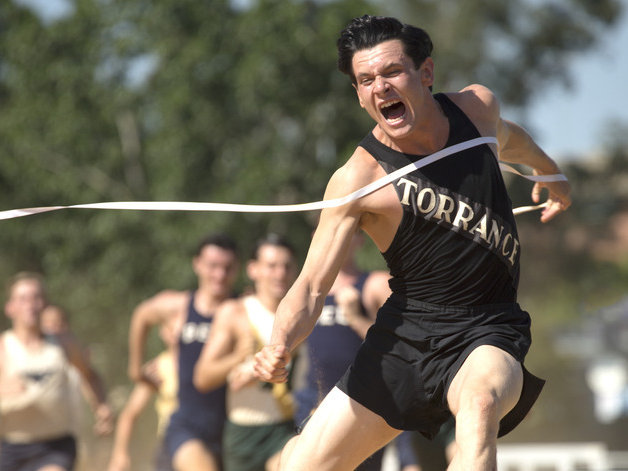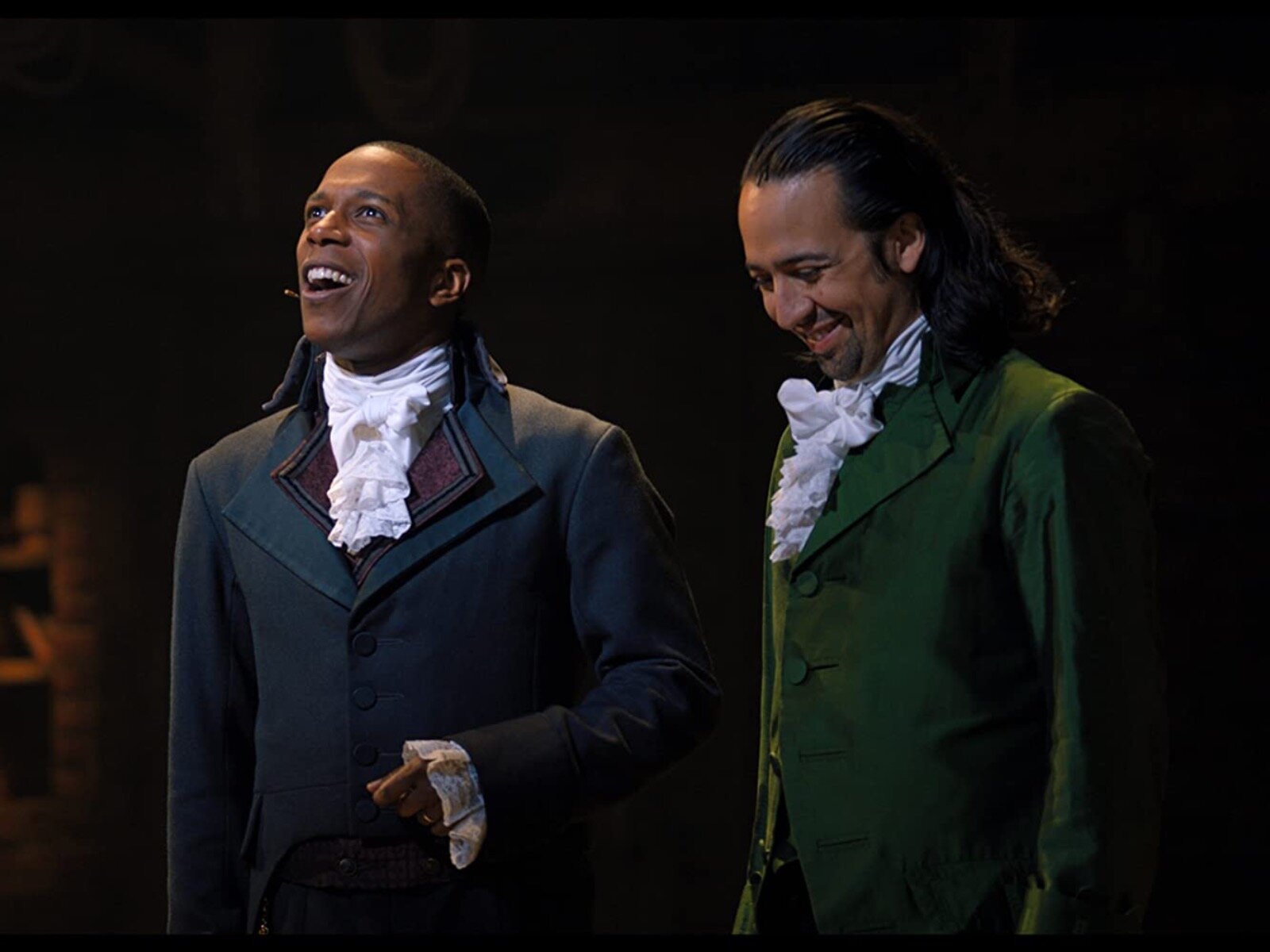You could list every potential synonym for incredible – amazing, triumphant, inspirational, awe-worthy, etc. – and it would still fall short of giving Louis Zamperini’s life its due. "Unbroken," the movie blessed with bringing his remarkable story to the big screen, unfortunately lives up to none of those words. It is anything but amazing or triumphant or inspirational or awe-worthy. It manages to take cinematic gold and morph it into pewter.
Even with all of the impressive names and capable hands on board – Angelina Jolie, legendary cinematographer Roger Deakins, Jack O’Connell and a screenwriting credit for the Coen Brothers … yes, those Coen Brothers – the best "Unbroken" can disappointingly present is a polished but utterly empty tale, 137 minutes of relentless struggle and survival and that’s it.
The child of Italian immigrants, young Louis starts off as a local troublemaker, stealing from neighborhood shops, getting into fights and drinking alcohol out of painted milk bottles. Right before reaching the end of his rope, however, Louis grows up (into up-and-coming Brit actor O’Connell) and reforms himself into a track star with the training and guidance of his brother, eventually making it all the way to the 1936 Berlin Olympics. He doesn’t make it to the medals podium there, but on the final lap, he does set a world record for the fastest lap time.
That alone would probably be enough drama for one life, but Louis’ story is far from over. War soon breaks out, sending Louis out into the Pacific theater as a bombardier. The perpetually failing upwards Jai Courtney – aka John McClane’s son in "A Good Day to Die Hard" – shows up as his pilot, the first concerning clue that "Unbroken" might be the cinematic equivalent of beige.
At least his screen time doesn’t last long, as their plane crashes in the ocean, leaving Louis and two other generically handsome crew members (Domhnall Gleeson and Finn Wittrock) as the lone survivors. For 47 days, the three men battle the boiling sun, furious storms, hunger, thirst, persistent sharks and the occasional strafing Japanese fighter plane. Only the occasional raw fish dinner and Louis’ stories of his mother’s homemade gnocchi manage to keep their collective sanities in check.
Certainly that’s enough harrowing struggle for one man and one movie to handle, but nope, the suffering has merely just begun. Louis is rescued at sea (yay!) by the Japanese (boo!), who place him into a prisoner of war camp. There, the camp’s lead guard (Japanese musician Miyavi) brutalizes Louis, taking every opportunity to beat and humiliate the former Olympian’s weakened body. Yet through thrashing after beating after thrashing after exhausting coal work, Zamperini – alongside his fellow POWs – stays alive and fights through the onslaught of misery, waiting and hoping for the war to end in order to get their ultimate revenge: survival.
There’s enough amazing material here to supply multiple movies. And yet even with all of that crammed into one screenplay, "Unbroken" falls shockingly flat. The segment going from childhood misfit to Olympic record holder is given the least amount of time, told with flashbacks during Louis’ pre-crash military days. It’s a pleasant enough redemption story, but the script doesn’t give it enough time or soul to come across as anything greater than some more impressive than usual backstory with a bunch of nice inspirational platitudes.
Meanwhile, the lost at sea chapter is "Unbroken" at its most involving, featuring some exciting sequences that provide a worthy rush. Their initial aerial military missions – one successful, one obviously less so – are impressively and intensely captured. Dogfights feel like a rarity in movies nowadays, so there’s a certain freshness to the action sequences, and Jolie does a solid job of capturing the tension of riding high in the air in a confined, crowded, thin metal box, doom on seemingly all sides.
The scenes at sea do a fine job of engaging as well, even if its drama is more familiar. Deteriorating at sea, fighting leaks and combating sharks are all common staples, but they get the job done here – and, thanks to a scene with an ill-fated bird, with a dash of humor.
When "Unbroken" lands at the prisoner of war camp, however, the film becomes an exhausting, repetitive march to the finale. We certainly gets plenty of scenes of Louis getting the crap kicked out of him, emotionally and physically. He’s whacked with rods, held in solitary confinement, forced to race while malnourished, forced into labor in a coal plant, whacked with more rods and given a chance at freedom only to be put back in camp and punched by all of his fellow POWs.
What we don’t get any of is Louis as a character. O’Connell is a compelling young actor, and he’s ready to go here, but Jolie and the script give him little to do other than suffer nobly. What’s going on inside his head? How is he coping? What’s keeping him fighting through all of these tests of physical and emotional brutality other than a phrase? It’s a tough journey, and the fact that he faced it down and survived all of it is obviously inspiring on its own. But the movie is content with banking on that fact and doesn’t bother going below the surface level of the experience.
By the end of "Unbroken," all you feel you learned about Louis is that he could withstand a lot of pain. He’s treated as merely an exemplar, not as a human. Since we don’t really get to know him – or his fellow POWs, who end up coming across as a personality-free parade of generic handsome white dudes – the story becomes monotonous, and the much desired inspiration rings hollow.
Jolie, making her second directorial effort after the little-seen Bosnian War drama "In the Land of Blood and Honey," has a promising eye and gets good performances, but she has little feel for giving a movie life. Its most engaging sequences feel like echoes of other, more memorable films. Even the great Roger Deakins is on his B-game. His B-game still looks better than most movies – his rich work with light and shadow is, as always, beautiful – but few images here stick in the mind.
At its best, "Unbroken" is fine and respectable … but Louis’ story isn’t notable for being fine. His life is a remarkable one, here turned into the opposite. No amount of mishandling could make his harrowing and powerful journey of survival devoid of any inspiration, but "Unbroken" is about as close as you’d want to get. Considering the potential and the talent involved, it's one of the more disappointing efforts of the year.
Hold on, though, because the saddest part of the "Unbroken" experience comes at the very end. Right before the end credits, the movie lets the audience in on what happened after the events just seen, like how he got married to his "beloved" (a woman we never meet or know). But then the movie tells you that he had to fight through PTSD. And that he eventually found God after all of this – something only tepidly hinted at early on in the film itself. And that he went back to Japan to grant forgiveness to his captors, never getting the chance to meet and reconcile with the man who brutalized him so.
Wait a second: Why didn’t I get that movie?! There’s more interesting, moving character work in those few titles than in most of the past 137 minutes! I get the idea of leaving people wanting more, but maybe you don’t want them leaving wanting more of a different movie altogether.
As much as it is a gigantic cliché to say that one has always had a passion for film, Matt Mueller has always had a passion for film. Whether it was bringing in the latest movie reviews for his first grade show-and-tell or writing film reviews for the St. Norbert College Times as a high school student, Matt is way too obsessed with movies for his own good.
When he's not writing about the latest blockbuster or talking much too glowingly about "Piranha 3D," Matt can probably be found watching literally any sport (minus cricket) or working at - get this - a local movie theater. Or watching a movie. Yeah, he's probably watching a movie.







